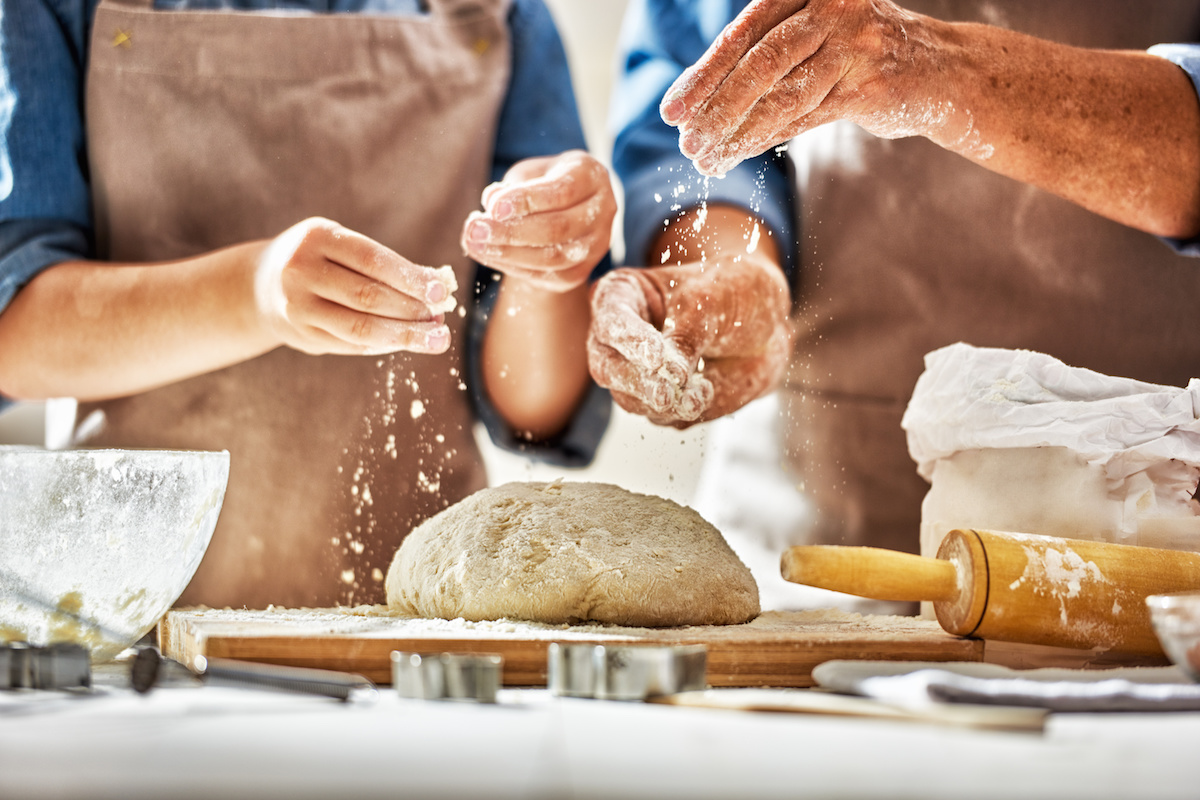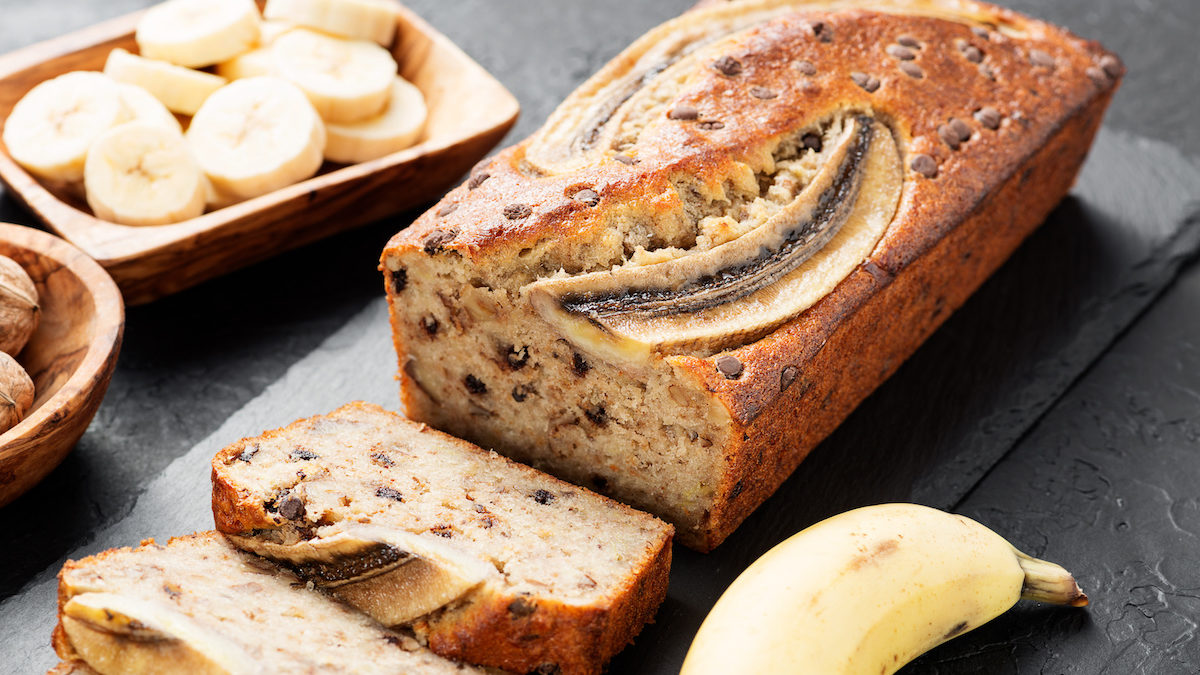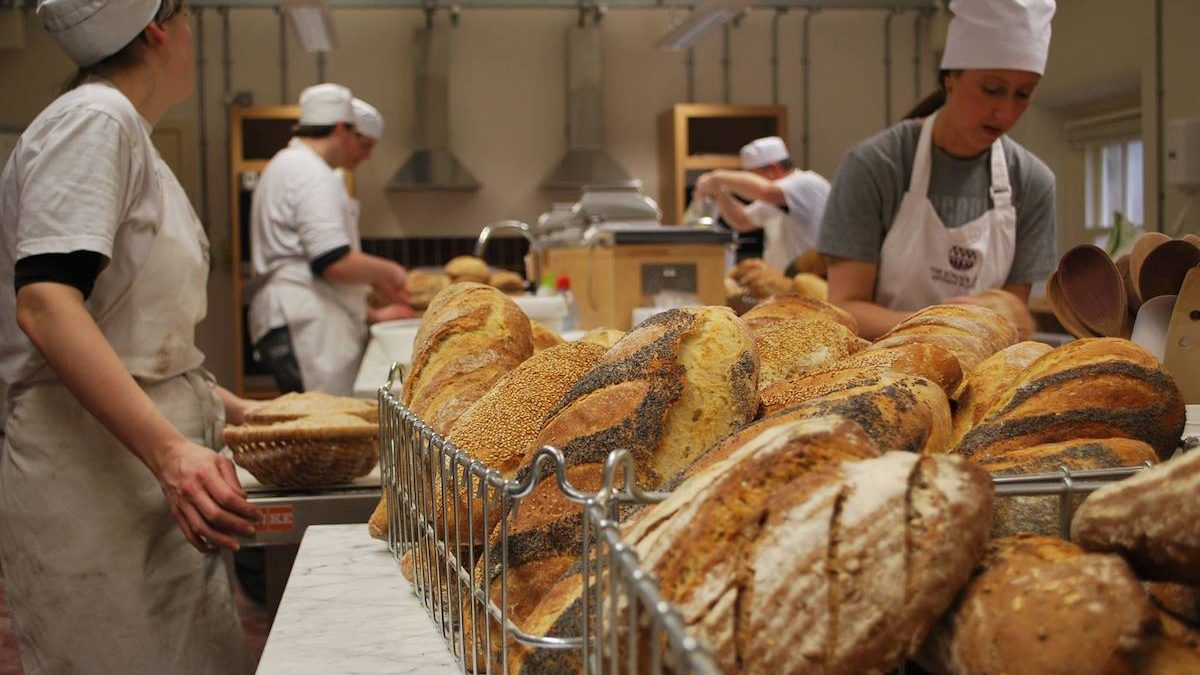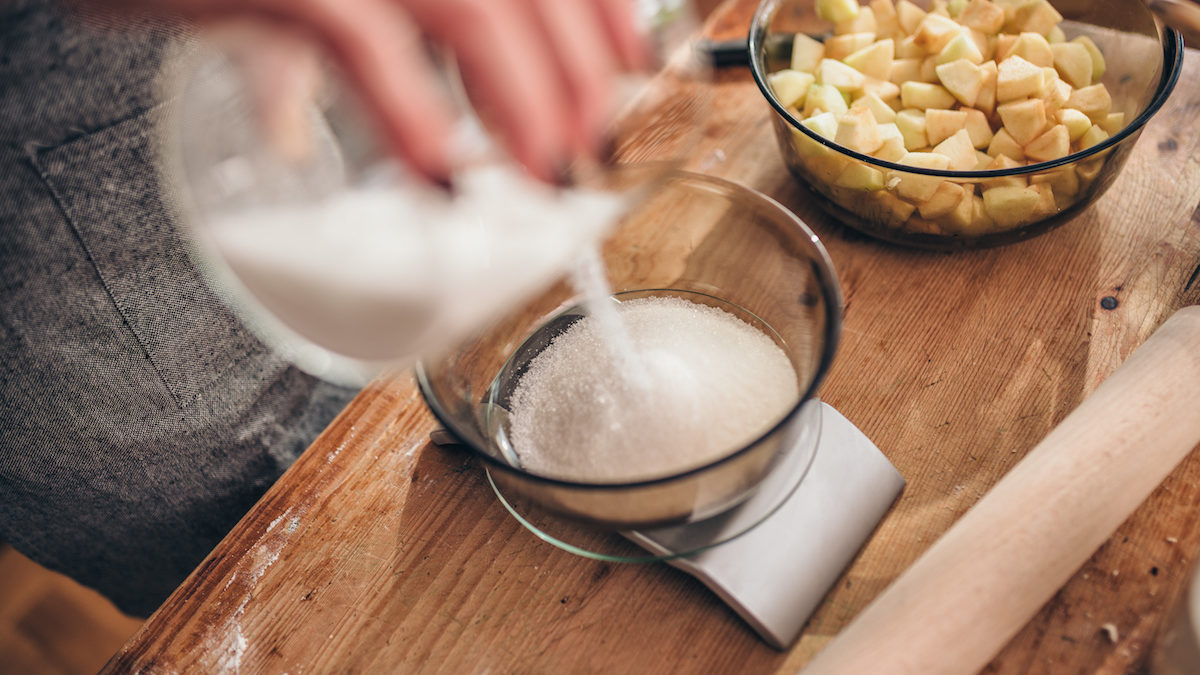Therapeutic Baking: Why and How the Stress of 2020 Has Led Us To Banana Bread

“Mum, do you want to bake another banana bread?”
It had been eight years since I left the family home to trot off to uni. But like the majority of my fellow twenty-somethings, lockdown had brought me back, and this time it wasn’t just a couple of weeks at Christmas.
My mum had gotten used to not having me and my sister around, so to have us both back, more brooding and anxious than we ever were as teenagers, must have been more difficult than trying to book an Ocado delivery slot. We found our collective solace in baking. No fighting over the remote or the kitchen table in our makeshift WFH space. Just concentration, teamwork, and scrumptious doughy banana bread (even if my messy ways left my mum grumbling). We weren’t the only ones.
Banana bread was the most-searched recipe on the BBC website through lockdown, while sales of baking goods rose by 50 percent, and flour producers doubled production but still struggled to meet demand. A YouGov poll found 53 percent of those who responded had turned to baking during April and May, which in real terms adds up to a massive 27 million of us.
Furlough schemes, lack of commute time, and nowhere to go obviously meant more time for us to take up the hobby. But is there more to it than that? The time away from our phones and TVs pinging daily ‘doom and gloom’ bulletins offered some good old fashioned respite, while the focus on creatively ‘doing’ took our minds further away from all these worries. Stress baking is nothing new, but during the lockdown, it had become almost necessary.

Stress Baking In Lockdown
“I’m a serial stress baker, I’ve been doing it for years,” says Dillon Thompson, a journalist living in New York. “Before the pandemic, working in the kitchen and trying new recipes was a way to manage anxiety. The more I baked, the less I focused on the 100,000 things I was worried about.
“It’s different during lockdown though. That part of it is still there, but to me, baking has been much more about exploration. The pandemic took away my ability to explore, try new things, or meet new people. Every day became the same, which got depressing very fast. Baking was the exception. In the kitchen, I could still create, improve, and try something new, and eat plenty of cookie dough in the process.”
For Amy Hill, a civil servant from Edinburgh, the extra time offered by lockdown gave her an opportunity to reconnect with a long lost passion. “I have always enjoyed baking and used to work as a baker in a small cafe while at university. I think I’m motivated by the fact that it gives me something to share with others. It’s a really good way to lift people’s moods and make them smile.
“Since graduating it’s been hard to find the time to bake, and it’s not the kind of thing that you should do in a rush. I think that’s why so many people turned to it during lockdown. Suddenly we could all take our time and do things that we might ordinarily think we are too busy for.
“I know that a lot of people’s mental health suffered in lockdown. I can see why people who are having these issues might turn to baking in particular. For me, it’s something completely mindful. You’re using your hands, you have to concentrate, and you need to pay attention to detail even if that’s just following the recipe.
“I also wonder whether, in a situation where things are so out of our hands, it’s felt good to have something that’s in our hands.”
Therapeutic Baking
Professional baker Ian Waterland is well versed in this link between mindfulness and baking. After 28 years in mental health care, Waterland undertook an advanced diploma at The School of Artisan Food, a cookery school in the middle of Sherwood Forest in Nottinghamshire.
From there he opened his own bakery, Knead Good Bread, in 2014, before returning to the school to lead courses that combine his dual passions. The first is Mindful Bread, where the class goes through and makes a recipe while Waterland weaves in bits about the history and principles of mindfulness, before putting them into practice with a guided meditation as the bake is in the oven.

Credit: School of Artisan Food
“I have people get to the end of that course and say, “Oh, my God, I haven’t thought about the kids, the dog, the shopping, work. It’s not crossed my mind for the last few hours,” which is perfect,” says Waterland with a clap of his hands.
The other course is Therapeutic Baking. Here Waterland adds in another level of theory around positive coping strategies for when your mental health is low.
“We really cover a lot of stuff around stressful vulnerability, the five ways to wellbeing, and some interweaving of theory to sort of give people that wider picture about mental health and positive strategy.”
While it sounds quite similar to the mental health management techniques present in Cognitive Behavioural Therapy (CBT), Waterland says that side of things would need a whole other course dedicated to it.
“The course covers a little bit of it [CBT], but rather than delve into thought patterns and processes, we’d much rather focus on strategies in the here and now. Practical stuff rather than the thinking side of it as much.”

Credit: School Of Artisan Food
That hands-on, in-the-moment practicality, it seems, is the true meeting point between the mindful and therapeutic side, and the baking part.
“There’s a fair bit of focusing on sensory awareness, which is my big thing really. Baking bread, in particular, I think is brilliant in terms of mindfulness because it’s hands-on. It’s tactile. Unlike most other forms of baking, you can do every bit of baking, other than actually putting it in the oven, by hand.
“You mix by hand. You’ve got to weigh the ingredients, which you can do with your hands rather than a spoon. You’ve got to look at what you’re doing. Smell is really important. Sound is important when you’re mixing the dough. When the loaf comes out of the oven it contracts and the crust starts to crack. So, if you’ve baked it right, the loaf sings. And then, of course, you eat it.
“You have to use all of your senses all of the time which really centres and grounds you in the moment, and that, as you know, is the central thing for mindfulness.”
How Baking Bread Can Help Your Mental Health
Anecdotally, the links between baking and positive mental health have been gaining traction over the past decade. John Whaite, the Great British Bake Off Winner in 2012, for example, has spoken openly about how baking has helped him manage his mental health down the years while producing cookbooks with recipes designed to help with stress and anxiety.
One of only a few pieces of research into the positive mental health effects of baking was a 2016 study on 659 students before and after they did some baking, knitting, or painting. Results showed the students overwhelmingly felt calmer and happier afterward, while some even reported having more energy.
Waterland believes there are correlations between therapeutical baking and the well-researched field of art therapy. “One of the things we do sometimes when we make the bread is we’ll score the top of the loaf before baking, and people have got quite creative with how they score the top. There is an analogy there with art and that basic level of being creative and productive.”
Both also cover the five ways to wellbeing that are an integral part of Waterland’s Therapeutic Baking course. For reference, those five ways are as follows:
- Connect: Strengthening relationships with others, and feeling close to and valued by others, is critical to boosting wellbeing.
- Learn: Being curious and seeking out new experiences at work and in life can positively stimulate the brain.
- Be Active: Being physically active, including at work, improves physical health and can improve mood and wellbeing and decrease stress, depression and anxiety.
- Give: Carrying out acts of kindness, whether small or large, can increase happiness, life satisfaction and general sense of wellbeing.
- Take Notice: Paying more attention to the present moment, to thoughts and feelings and to the world around, boosts our wellbeing.
The connecting element was certainly a big part of the baking experience during the lockdown. A quick scroll through #homemadebaking on Instagram reveals reams of glorious creations, while 45,000 new photos of banana bread popped up on the social media platform in April alone. Tweets upon tweets around people’s lockdown exploits in the kitchen turned baking almost into an in-joke; only one that 27 million people could understand.

The giving factor is also big, especially if you’re baking for your family and friends. And of course, as previously mentioned, the taking notice part is ignited by the senses that come flooding through. These can also lead to a sense of nostalgia and comfort, another mood-boosting aspect we shouldn’t ignore.
“A lot of people have baking in their childhoods and in their background, maybe with a parent or a guardian, somebody who baked with them when they were younger. So I think there’s a sort of comfort and security element to it as well.”
Baking For A New WFH Generation
The mental health benefits are there, but it’s important in our post-lockdown future that we don’t forget to use them. Recent calls from MPs for a four day working week suggest that office life as we once knew it has changed irreparably.
We had become so accustomed to commuting for hours and spending hours sat in front of our laptops without breaking, that we never stopped to think whether this was productive, let along good for our mental and physical health.
A study this year looking into work-from-home productivity found a 47 percent increase based on criteria including start time, CRM activity, and replies to emails and telephone calls. On top of this a study from the University of Illinois found that participants who took more breaks while working had the highest mental stamina at the end of the 50 minutes.
Now obviously the more time we’re expected to work from home in the future, the more opportunities we’ll get to bake. But the fact that there are natural breaks involved in baking also make it the perfect WFH distraction.
“If you do a burst of work activity and then get up, walk away, do a little bit of kneading and put the lid back on the bowl before going back to work, then you’re getting two things out of the day. You’re getting your work done and you’re getting a loaf of bread,” explains Waterland. “Rather than coming out of work, going straight into your phone and getting all that overstimulation that’s not good for our brains.
“We can get mental overload. What you want is peace. We need physical and practical, and that’s the balance to work.”
Before you head into your next bake in between the countless reports, remember to focus on your senses and prepare for the bake ahead. Put your phone and laptop away, clear your work space and tidy as you go along.
“A few minutes giving yourself a nice bit of space makes your baking a much more positive experience,” notes Waterland. “Then, as long as you set yourself a little timer or can make out the time, you can nip off, and then come back to it.”
And, anyway, if work does come calling, just say you’ve got another banana bread to bake.


















